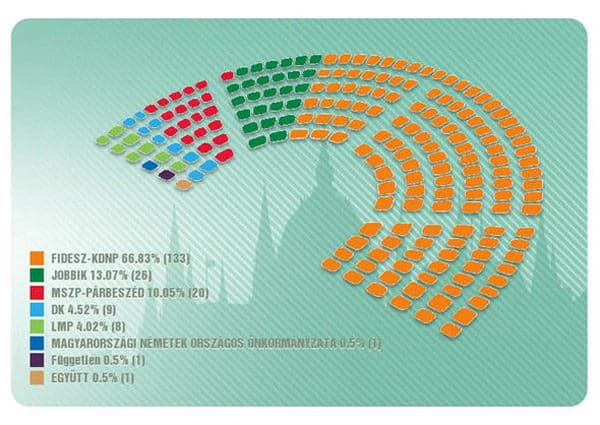Hungary Election Gives Orban Big Majority, and Control of Constitution
Marc Santora, New York Times, April 8, 2018
Prime Minister Viktor Orban of Hungary, who has set about transforming this former Soviet bloc member from a vibrant democracy into a semi-autocratic state under one political party’s control, appeared to have won a sweeping victory in national elections on Sunday, with 93 percent of the vote counted.
By securing two-thirds of the seats in Parliament, Mr. Orban’s party, Fidesz — along with its ally, the Christian Democrats — now has the power to change the Constitution and further bend the nation to his will.
{snip}
Gabor Vona, the leader of Jobbik, the largest opposition party, conceded defeat while lamenting the tenor of the election, which he called “the hate campaign.”
“It was not easy to campaign with so many lies and attacks,” Mr. Vona said. “We failed,” he added. “Fidesz will keep ruling the country.”
{snip}
Mr. Orban built his campaign on castigating Western nations as a hostile, multicultural force, where Muslim immigrants ran wild and where traditional family values were under constant assault.
{snip}
As Mr. Orban systematically co-opted the tools of the state — from the courts to the schools to the electoral system itself — Brussels has proved unable to effectively pressure him to change course.
On Sunday, it was the voters who got their chance to have their say.
{snip}
Immigration was a major focus of the election, and throughout the day, state television replayed some of the most dramatic images from 2015, when the crisis of refugees and immigrants flooding into Europe from the Middle East and Africa was at its peak.
For Attila Boda, 48, an army reservist and dishwasher, the perceived threat to his country was persuasive. He cast his two ballots for Fidesz.
“We don’t want migrants to come to Hungary,” he said. “They are unwilling to integrate and they respect only their own laws. They want a war; they are brought to Europe by ISIS.”
{snip}
Mr. Orban has cast himself as the only person capable of defending Hungary from threats seen and unseen. He has also tapped nationalistic sentiments by portraying officials in Brussels as meddling bureaucrats who are a threat to Hungary’s sovereignty.
{snip}
“We do not want to be a multicolored country,” he said during a speech in February. If his point was not clear enough, he said that he did not want Hungarians to interact with immigrants “in such a way that our color is mixed with others’ colors.”
{snip}
Edit Zgut, a foreign-policy analyst at Political Capital, a research organization based in Budapest, said Mr. Orban had proved effective at channeling public anger. Among the most frequent targets of Mr. Orban’s scorn has been George Soros, the American billionaire and philanthropist who was born in Hungary.
Ms. Zgut said that Mr. Orban’s attacks on Mr. Soros, and on the European Union and the United Nations, served a dual purpose: to channel the frustration of anti-establishment voters toward leaders in Brussels and to drive home his contention that migration is the driving factor behind Western accusations that his government was weakening the rule of law even as corruption spreads.
“If he portrays Brussels and the E.U. as the enemy of the state, his voters might consider the E.U.’s criticisms of the government as part of a broader conspiracy that questions the sovereign decisions of Hungarians,” she said. “This is why he keeps repeating that this clash between Brussels and Hungary is all about migration.”
{snip}
















